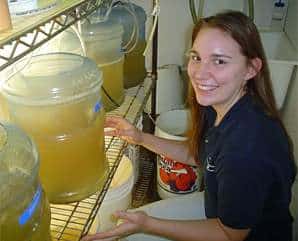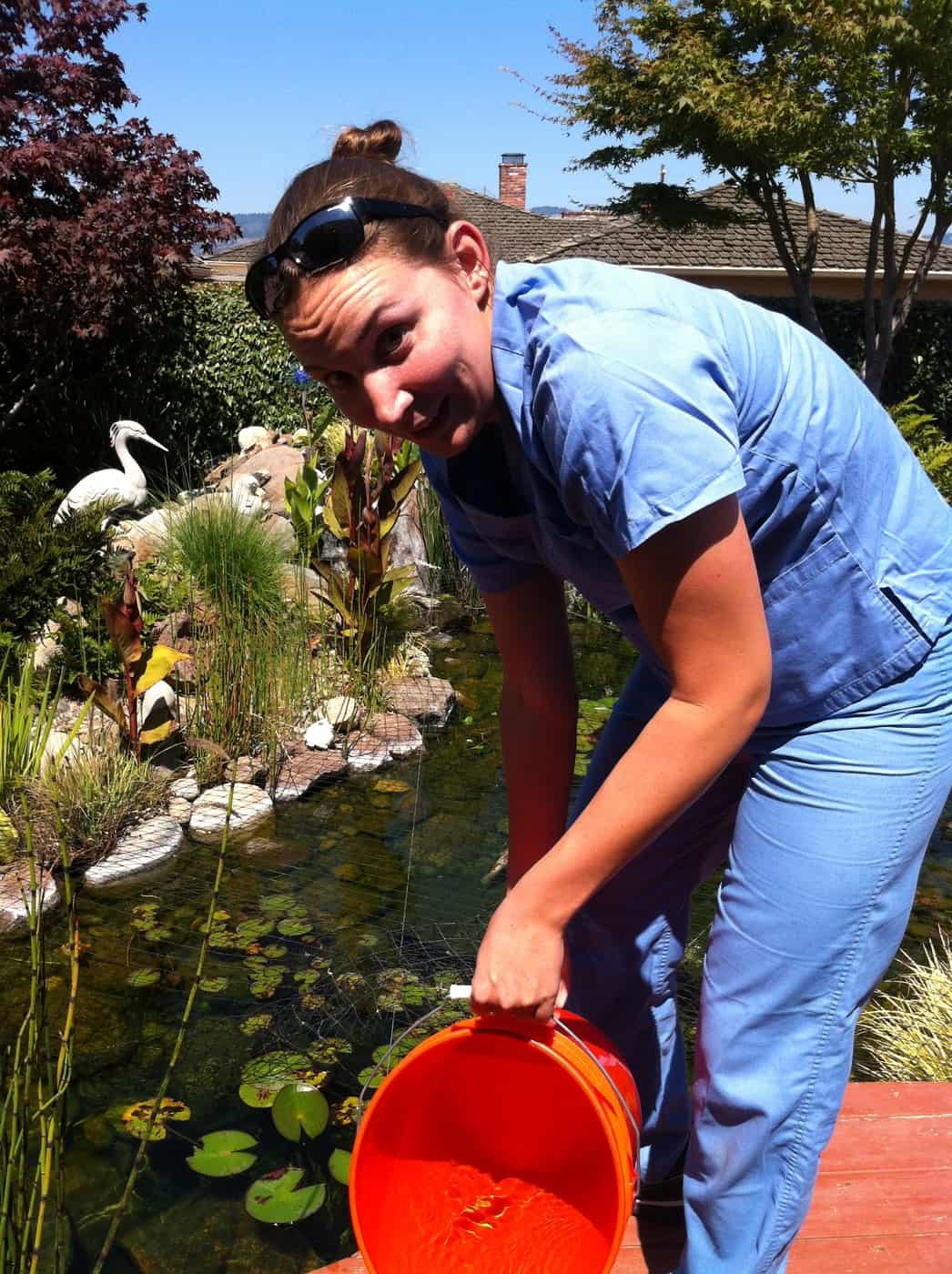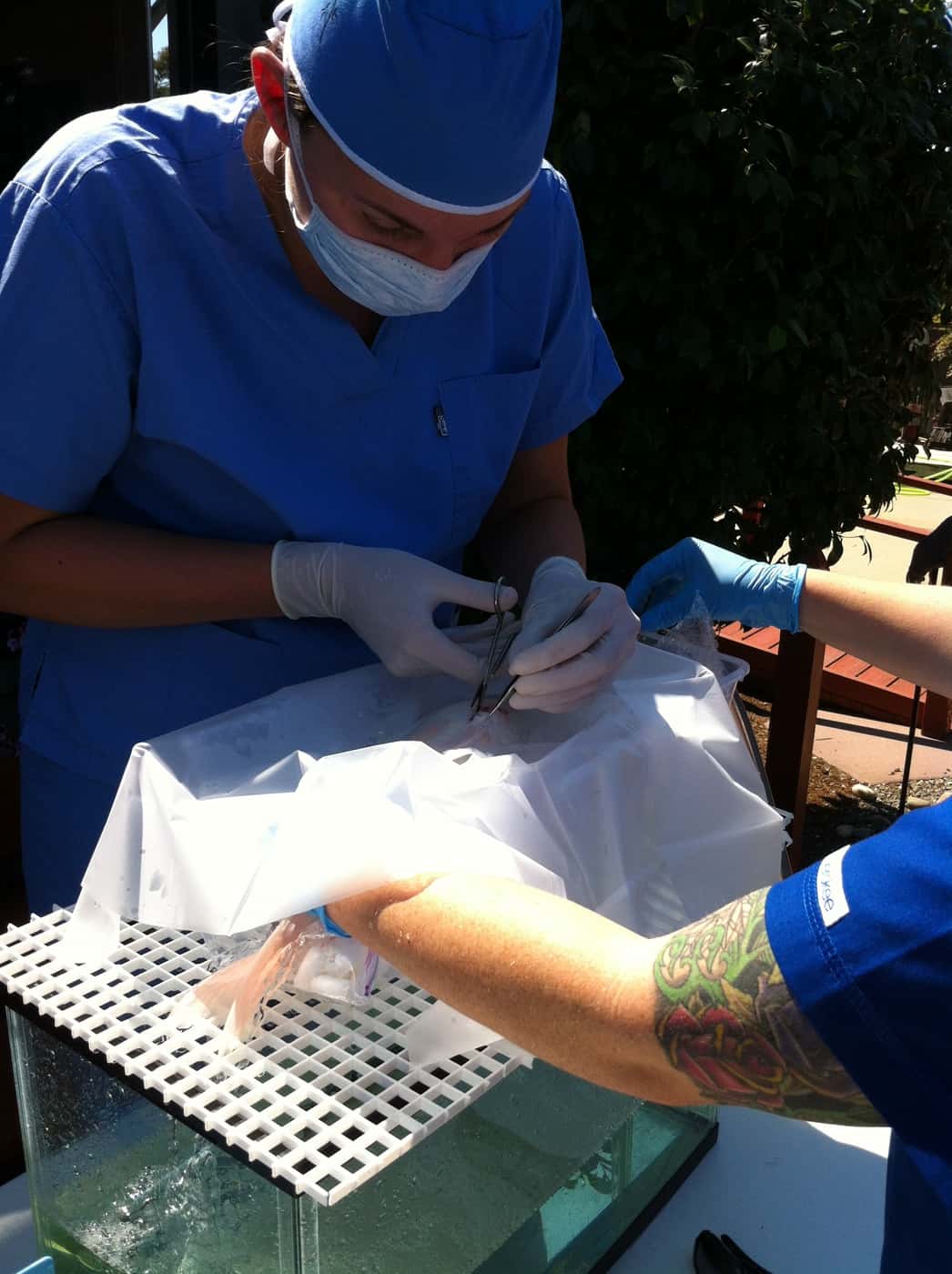If I could only offer one piece of advice to all of you would-be veterinarians out there, here it is: volunteer. Volunteer for your local animal shelter, zoo, aquarium, veterinarian, kennel, dog park or anything out there that has to do with animals. About 50% of the veterinary curriculum is how to act and what to do around animals. Be they a calm, serene older laborador, a feral cat who wants to remove your eyeballs, a scared, abandoned baby bird, a seal learning how to eat or a fish who does not want to be caught, all of these animals can teach you something. Yes, I know, volunteer = no pay, but what you gain is better than money.
When I was in undergrad at the University of Rhode Island, I volunteered for a local animal shelter and Mystic Aquarium’s fish & invertebrate and stranding departments. At the animal shelter, I helped with the cats looking for homes. I would clean their cages, removing soiled beds and litter boxes. It was not glamorous work, but I learned how to keep a wily cat from escaping out into the hallway, how to handle a cat that just didn’t want to be touched, and what kind of pets and rubs got me the best reaction. I learned a lot about handling animals that came in very handy when I started veterinary school. Plus I got to pet and cuddle lots of cute kitties, a job I will always love.
Mystic Aquarium is where my career started. I am currently a fish veterinarian with my own thriving practice in California. What I learned by volunteering at the aquarium is why I am a fish veterinarian. Being the weird applicant who had her primary background in something other than cats, dogs and horses is probably why I was taken off the wait list at Tufts and accepted to veterinary school. Diversity is a wonderful thing. Especially if you’re the oddball fish-kid.
At the start of my volunteer career at Mystic, I hadn’t done much fish-keeping except for a small tank I had at home when I was about 10. Large-scale fishscapes were completely foreign. I didn’t know about food, filters, water chemistry or really anything. My first ever job at the aquarium was to clean the backup octopus tank. I had acquired the annoying habit of showing up during the aquarists’ lunch hour, so this job kept me quiet and out of the way. Squirt, the octopus, would sometimes nap while I was cleaning or take a ride around on my long gravel siphon. I learned which valves to open and close, important to not overflow the tank, how he liked to be fed and what a tentacle feels like wrapped around your wrist. Thankfully, I did not find out how it feels to be bitten by an octopus. Yes, they can bite. It’s called a beak. Look it up!
From there, I became the most annoying volunteer ever. In a good way, that is. Another piece of advice: when you become a volunteer, don’t just go through the motions. You must learn to ask, “what can I help you with?” Do it again, and again, to everyone you can. You’d be amazed what you get to do if you just ask. Now, it will not likely be something fun all of the time. Cleaning that awkward tank with the nippy fish or growing fruit flies is not glamorous. But you’ll eventually get to do all the fun stuff (like feed the giant stingray tank!) and even help with special projects (physicals on all the big sharks? Hold this clipboard and record stuff? OKAY!). Before I left every day, I made sure to ask everyone on the staff if they needed any help. And although I started only one afternoon a week, I learned a lot, and fast.

So, the years and countless hours went by. I got to start training other volunteers and ran all the different galleries. I learned how to culture plankton and that eventually turned into my senior honor’s project at URI. It involved a lot of extra lab work doing nutritional analysis and even sleeping overnight in the aquarium to get 2am hatch bring samples! And that was only the fish! After a year with fish and inverts, I started volunteering with the stranded marine mammal department. They shared an office with F&I at the time, so I knew the staff from the beginning. Now I had to learn how to handle mammals that had no contact with humans! Seals may be cute, but they would prefer it if you left them alone. The little, helpless harbor seals are only helpless until they learn to eat fish, then watch out for those teeth! Large seal exams sometimes take a large crew of people, just to get an ultrasound to check their blubber thickness. I am still in the seal rescue business, out here in California. I am the Friday supervisor for the Monterey Bay Operations of the Marine Mammal Center. It’s the equivalent to Mystic Aquarium’s rescue program on steroids. Lots more critters that need to be rescued off the beach, treated and then shipped up to the main hospital in Sausalito. But in working with some many different seal species for almost 8 years now, I am confident in my abilities to get into them meds and food while they want to rip my head off.

Now, how do all these volunteer skills equivocate to my career? Well, #1 has to be how to catch a fish. The best thing that being an aquarium volunteer taught me was how to catch a fish. It took a while to master, but now, I am a fish catching expert. It may sound like a silly little thing, but considering how much I do it now, it sure comes in handy. Clients are always amazed that I can catch the exact fish I want to look at with minimal effort. Key point #1: go slow. Some people ask me, “what do you do for weight training?” My answer: haul a 10’ pole with a net through the water after a fish. Sometimes, you need two nets to snare a particularly feisty fish. Yes, they can jump out of the net in about 6” of water, so a net on top is sometimes a good idea. Without my fish catching abilities, I could not do my job. So thank you to all the fish at Mystic that let me practice on them.
The second thing I learned is how to explain things while in the process of doing them. When you walk onto the main floor during business hours with a container of anything in your hand, people are going to ask what you are doing. You have to be able to talk about what and why you’re doing what you’re doing, while you’re doing it. You may do the same thing every time you volunteer, but the people will always be different. They will ask insane questions. They will ask stupid questions. They will ask intelligent questions. You have to be able to answer their

questions while working, and it’s not always easy. I was trying to feed one of our small alligators when a visitor asked me a question. Taking my eyes off the tank for one second was enough for the gator to latch himself onto the very tip of my finger. Luckily, he didn’t break the skin, but I had to act for the sake of the visitor that nothing was wrong. In my job now, I have to perform water chemistry tests, examine fish and look at samples through my microscope all while having a full conversation. Even surgery requires a running commentary. Fish surgery is such a mind-blowing concept that I get to explain it mid-snip or suture to my client, my assistants and anyone else who wanders by. People usually have never seen a fish vet work, so they’re always interested in what is going on!
One of the next biggest things you learn by volunteering is a strong work ethic. You are there by choice, so if you’re given a task you don’t want to do, you don’t have to do it. You can say no, since you are a volunteer. But you should not, at any offer of work, say “no.” Not unless there is a valid reason for you not too (i.e. physical limitation). At my job, I am a staff of one in a field of one. If I don’t do it, no one will. I personally hate talking on the phone. The first person

I hire will be a receptionist to answer my phone. But, guess what? If I don’t do it now, I will have no clients. To keep a company up and running by yourself is not easy. You have to have the passion to pursue your dream no matter what, and thanks to my days volunteering at Mystic Aquarium, I know where I am going.
So for all of you high schoolers and undergrads wondering what to do with your free time, don’t go with the highest bidder. Sure, I understand that money can be fun, but doing something for free that inspires you can unlock your future. You may not be able to buy all the things you want, but being able to play with an octopus once a week is so much more awesome. At least for me it was.
This article is dedicated to all the Fish & Invert and Stranding crew at Mystic Aquarium, both past and present.


Wow! So interesting and what a great introductory to the purpose and “how to” for volunteering…I love getting to know you through your writing! Joan
Pingback: Learn More About Dr. Jessie Sanders – Aquatic Veterinary Services of Northern California (AVSNCA)